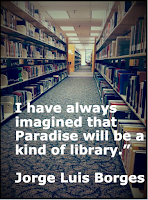How library collections promote Intellectual Freedom
The
webinar I chose to include is a good base for promoting intellectual freedom
within academic libraries. It is titled: Collection Development Basics. The
webinar can serve as a good starting point for those starting library employees
who need training on the concepts of intellectual freedom, and can also serve
as a refresher course for those library employees who manage library
collections and promote library services.
The
workshop’s main objectives are the following: Definition of collection
development; Concepts of Intellectual Freedom that inform collection development;
Outline of the collection development cycle; and Basic community needs
assessment tools. The webinar discusses how a library collection is dependent
on proper selection and the importance of deciding which materials should be
added to a library collection. The webinar payed special focus on how library
resources must represent in some way or form the members of its community. The
resources of the library should reflect the information needs of its members.
The webinar discusses what intellectual freedom is. Intellectual freedom
involves the right of every individual to both seek and receive information
from all points of view without restriction. Libraries should provide free
access to all expressions of ideas. The contrary to this concept is censorship.
Censorship is the suppression of ideas and certain information. The workshop
mentions that people can get upset at libraries when they object to certain
contents that are made available. Common issues that have been challenged by
patrons are: graphic novels, articles that discuss abortion or drugs, books on locksmith, the Coran and books that include racial slurs.
Library
staff should understand that perceptions and standards are not the same as everyone’s.
Libraries protect people’s right to read and view information- the Library Bill
of Rights.
Overall,
the webinar is very informative on what the concept of intellectual freedom is about
and its relationship to the members of the community. The workshop mentions the
community’s role when it comes to building a collection. Understanding the
needs and having an idea of who are the people that make up a community is
vital to creating a collection that appeals to as much people as possible.
Generally, intellectual freedom and freedom of information in libraries is
viewed through the sources or services offered by the library. I believe this
is a good tool to understanding intellectual freedom. Being clear as to what
this entails will make sure library staff are upholding one of the library’s
main tenets.
Citation:
Idaho State Library. “Collection
Development Basics." Webinar. Alternative Basic Library Education. 2011.


Comments
Post a Comment